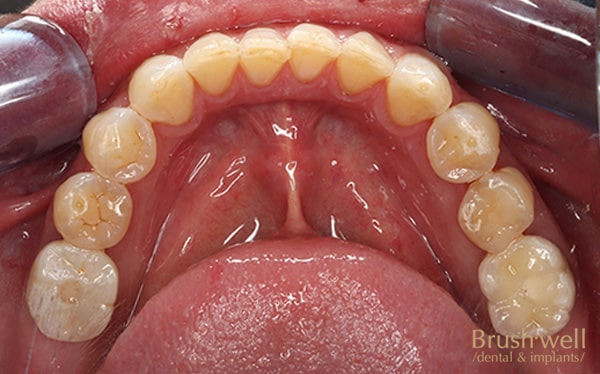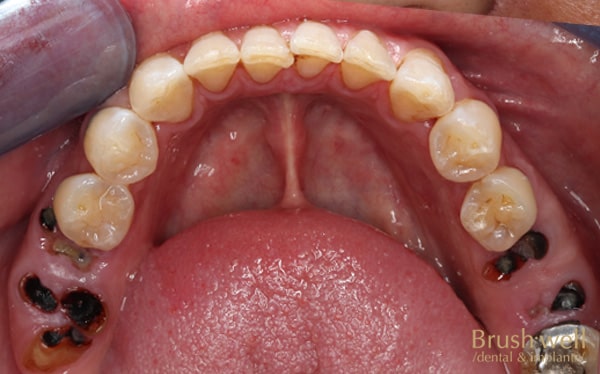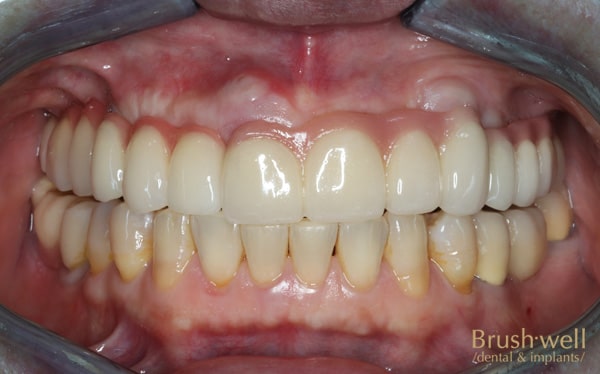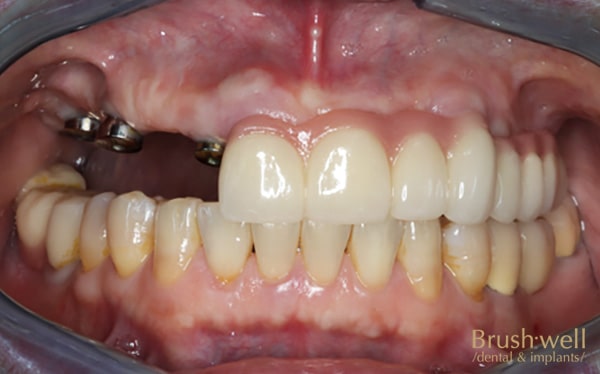Dental Implant Overview
Dental implants are the gold standard for teeth replacement. They are designed to look, feel, and function like natural teeth. With the assistance of dental implants, people are able to live more freely—they can eat whatever they choose, they can smile confidently without hesitation, and they can let go of unnecessary worries of facial shrinkage from bone loss.
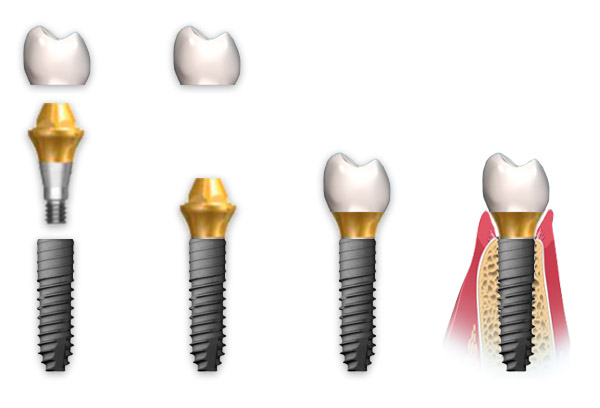
Prosthetic Crown
Functions like a tooth
Abutment
Connected with a screw
Titanium Post
Protects against bone loss
Osseointegration
When implant post fuses with jawbone
What are dental implants?
Dental implants act as replacement teeth and are made of three parts: (1) a titanium post, (2) an abutment, and (3) a crown. The titanium post substitutes a tooth root, and it is surgically placed into the jawbone. This post then fuses with the jawbone, a process known as osseointegration, that helps stabilize and anchor the implant.
When the bone integrates with the titanium post, it protects the jawbone from atrophying, which occurs when a missing tooth is not replaced. This post preserves bone structure, preventing facial shrinkage and the migration of adjacent teeth.
A healing abutment or cap is placed atop the titanium post, which helps gum tissue heal around the surgical site. Once the gum is healed, final abutments are placed so the prosthetic crown can be connected to the implant post.
What types of dental implant prosthesis are there?
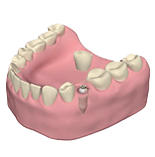
Single-Tooth Implant
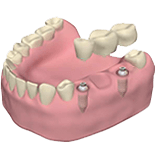
Fixed-Implant Bridges
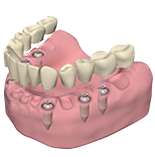
Full Bridge
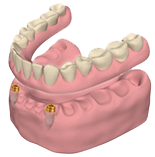
Locator-Attached Dentures
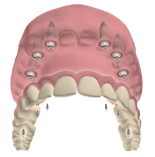
All-on-X
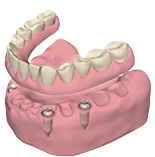
Retained Dentures
A single prosthesis crown replaces a single missing tooth. A fixed bridge partial prosthesis can replace two or more teeth, and may require two or more implants. A complete fixed bridge prosthesis replaces teeth for an entire arch, and may require six to eight implants per jaw.
The type of prosthesis, whether permanent (fixed) or removable, will determine the number of implants required. A removable prosthesis, called an over-denture, attaches to dental implants like a snap-on button. Such a prosthesis provides a more stable connection than traditional dentures, and is readily removable. On the other hand, fixed prosthesis are permanently secured to an implant post and can only be removed by the dentist.
Both permanent and removable prosthetic treatments have their pros and cons, and our restorative professionals will gladly discuss with you all your available options.
Why choose dental implants?
Dental implants have the potential to transform your life for the better. It is the one of the few procedures that gives an immediate return on investment—both in how patients feel about themselves and the freedom they are now afforded to eat and smile whatever and whenever they want.
It is hard for most people to ever feel okay with having several missing teeth. They often think about what a life with normal, functioning teeth would be like again. And that’s because teeth plays one of the most significant roles in your life—it’s the start of proper digestion and first impressions.
Dental implants can offer you a new life, a second chance. Imagine waking up without dental worries, knowing your jaw is not deteriorating and your face isn’t shrinking. Imagine smiling confidently with your loved ones. Imagine the freedom to eat those meals you’ve been putting off because they were either hard or impossible to chew. This new life is within reach with dental implants.
What’s the difference between dental implants and traditional restorations?
Bridges vs. Implants
You often save more in money, frustration, and teeth loss, with dental implants compared to traditional bridges. It’s better to save your natural healthy teeth, if possible. There’s a cost to sacrificing healthy teeth to support a bridge. First, they become more prone to infections (which could necessitate future replacement). And the area of the jaw with the missing tooth may deteriorate. The placement of a single tooth implant, instead of a traditional bridge, may often save you from future headaches and costly procedures.
Traditional Dentures vs. Implant Prosthesis
Traditional dentures are often inconvenient and uncomfortable. And worse, dentures don’t help preserve your jaw bone from atrophying, affecting your facial structure and comfort. The hassle of removing and replacing can often be frustrating. And the looseness or tightness may be aggravating. The chewing force with traditional dentures is minimal and sores caused by dentures are very frustrating and uncomfortable.
What type of anesthesia is used at your office?
At Brushwell Dental, we perform our dental implant surgeries (including bone grafts and sinus lifts) using local anesthesia, which is sufficient for our patients. We have a conservative approach to pain management that allows for patients to receive the highest standard of care and a peace of mind.
Do dental implants require special care?
You must care for your dental implants like you would your teeth. That means following proper oral hygiene of brushing and flossing daily, and scheduling regular 3-month appointments with your dentist. Some patients with fixed full-arch implant prosthesis may be recommended an annual removal of the prosthesis by our specialist to maintain cleanliness (and during this annual procedure, the screws may be replaced).
Benefits of Dental Implants →
This article is intended to promote understanding of and knowledge about general oral health topics. It is not intended to be a substitute for professional advice, diagnosis or treatment. Always seek the advice of your dentist or other qualified healthcare provider with any questions you may have regarding a medical condition or treatment.
